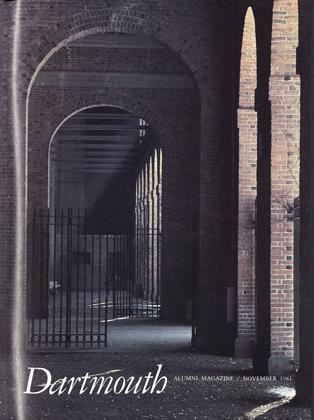NOT long ago a friend asked me whether I liked to tell people that I go to Dartmouth. The abruptness of the query flustered me. Then, with a bit of hesitation, I replied, "Yes." I realized that others could easily misconstrue my response as boastfulness or, just as easily, dismiss it as trivial. But I also realize that I would now be sorry if I had felt compelled to answer otherwise.
Why, one might wonder, should I care at all about that instinctive reply? It condensed into three letters the scores of opinions relating to Dartmouth that I have gathered in the course of my undergraduate days. Moreover, that summation signified - by its positive nature my sense of pride in this college community, my sense of belonging to all that "Dartmouth" connotes. And those sentiments, of course, underpin that entity well known as Dartmouth Spirit, something that I would hate to lose.
Trite-but-true best describes the qualities habitually attributed to Dartmouth Spirit. Although it may sound like hollow rhetoric, that feeling of shared identity really subsumes individual differences and unites strangers as kinfolk. Culled from a mere four years of common purpose and experience, it engenders lifelong bonds that transcend both time and place. Normally an intangible force, the spirit seems to materialize before us when the strains of the alma mater swell through the swaying ranks in Memorial Stadium. Its'ubiquity reveals itself in a wave of amazement when suddenly, hundreds of miles from home, a familiar green T-shirt turns the corner.
Too often, though, mention of Dartmouth Spirit evokes only congenial memories of bonfire-building and class reunions, intramural softball and Winter Carnival. How glibly we lay claim to an association with this historic institution, reciting its virtues to the world at large while muffling murmurs of discontent. We expend little effort when portraying Dartmouth as Utopian, and consequently such portraits have just superficial value. The spirit emanating from them, then, ebbs when challenged by reality.
In contrast, the spirit that manages to sustain an optimistic outlook while grappling with the less pleasant dimensions of Dartmouth thereby withstands challenges to its legitimacy. For example, charges of anti-intellectualism and excessive alcohol consumption have lately echoed through College halls. Perhaps not altogether justified, they nonetheless ought to chafe Dartmouth Spirit enough to make the spirited re-evaluate their attitudes and actions, to rally them behind the College as in the past but with more critical eyes. In the end, the spirit will emerge unflagging and infused with new value for having weathered the assault.
Recent years have introduced many changes at the College, changes which have tested the resilience of Dartmouth Spirit time and time again. Coeducation, for instance, once a radical concept, now enjoys the status of an accepted norm. Like all the traditions it has ever encompassed, Dartmouth Spirit needs to absorb rather than deflect changes in order to stay healthy. One of those traditions, the former Indian symbol, aptly illustrates this point. Ironically, the community divided itself into warring camps over the issue of the emblem's censure precisely because the unifying spirit it had embodied remained so strong. I have absolutely no wish to revive that controversy now. However, I do want to suggest that Dartmouth Spirit survives, and survives better, without a symbol that would have destroyed its own meaning.
In the final analysis, then, we find Dartmouth Spirit alive and well, adept at surmounting obstacles thrust in its path. It may indeed tend to lean too far toward an extreme idealistic wing, but who would not prefer that inclination to its opposite? Adversity at the College should not go unrecognized, but dwelling on it denigrates all the good to be found here. And in the foreseeable future at least, the good will continue to outweigh the bad.
 View Full Issue
View Full Issue
More From This Issue
-
 Feature
Feature"Now we had to go in different directions"
November 1981 By Rob Eshman -
 Feature
FeatureA record of their fame
November 1981 By Eddie O'Brien -
 Feature
FeatureB & G
November 1981 -
 Article
ArticleMaster Carpenter, Journeyman Blackmailer
November 1981 By Shelby Grantham -
 Class Notes
Class Notes1959
November 1981 By William G. Long -
 Class Notes
Class Notes1961
November 1981 By Robert H. Conn
Lisa Campney '82
-
 Article
ArticleThe Start of Something
SEPTEMBER 1981 By Lisa Campney '82 -
 Article
ArticleA Lesson in Survival
JAN.- FEB. 1982 By Lisa Campney '82 -
 Article
ArticleRound and Round It Goes
JAN.- FEB. 1982 By Lisa Campney '82 -
 Article
ArticleSaturday Night Conscious
APRIL 1982 By Lisa Campney '82 -
 Article
ArticleLife, Lively, Living, Alive
JUNE 1982 By Lisa Campney '82 -
 Article
ArticleSeason of the Plague
JUNE 1982 By Lisa Campney '82







